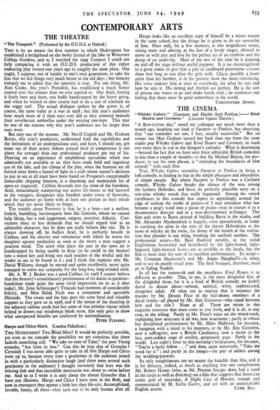THE CINEMA
,‘ Whisky Galore." (Gaumont and Marble Arch Pavilion.)---- Kind Hearts and Coronets." (Leicester Square Theatre.)
" A RED-LETTER day," noted my colleague not much more than a month ago, laughing out loud at Passport to Pimlico, but observing that " our comedies are not, I fear, usually successful." But no sooner has Miss Graham turned her back than out from the same studio pop Whisky Galore and Kind Hearts and Coronets, to mark two more days in red in the filmgoer's calendar. What is heartening —beyond the fact that we have seen three admirable British comedies in less than a couple of months—is that Sir Michael Balcon, the pro- ducer, to use his own phrase, is "extending the boundaries of film comedy " with each film.
True, Whisky Galore resembles Passport to Pimlico in being a folk-comedy, in finding its fun in the simple pleasures and absurdities of simple people. But where Passport to Pimlico was a Cockney comedy, Whisky Galore breaks the silence of the seas among the farthest Hebrides, and bases its perfectly plausible story on a war-time whisky wreck that really happened. Among the varied excellences in this comedy that capers so appealingly around the edge of realism the stroke of genius—if I may introduce what has become a prig's word into a paean of praise—was to entrust it to a documentary director and to a near-documentary technique. The film unit went to barra instead of building Barra in the studio, and Mr. Alexander Mackendrick is happily, even uproariously, at home in catching the glint in the eyes of the thirsty Hebrideans at the news of whisky on the rocks, the droop of the mouth at the realisa- tion that plunder is one thing, breaking the sawbath another. The professional actors—Mr. Basil Radford notably, as the stolid Englishman bewitched and bewildered by the light-footed, light- fingered, light-hearted Scots—are as credible as the locals, but the film is more than the sum of its excellent performances. Its script— Mr. Compton Mackenzie's and Mr. Angus Macphail's—is witty, and so are its purely visual jests. The final bouquet, therefore, must go to Ealing Studios.
In all but the teamwork and the excellence Kind Hearts is as different as possible. This, to me, is the most delightful film of the delightful three, for it is a kind of British comedy we hadn't dared to dream about—urbane, satirical, witty, sophisticated, altogether adult. Of what use to explain that it recounts the murder by Mr. Dennis Price of the half-dozen members of a ducal family—all played by Mr. Alec Guinness—who stand between him and the title ? None at all. There are twists in this exquisite nonsense that must come to you fresh, and it is all, in any case, in the telling. Partly in Mr. Price's voice on the sound-track, explaining how necessary it all was, how wearisome ; partly in robust but disciplined performances by Mr. Miles Malleson for instance, a hangman with a mind to his manners, or by Mr. Alec Guinness, now a suffragette, now a British Casabianca, now a rector in the last, port-sodden stage of senility, gorgeously gaga. Partly in the words. Last night's lover to this morning's bridegroom, for instance, " You're a lucky fellow . . ." and then, quite innocently, " Take my word for it " ; and partly in the images—the pair of antlers among the wedding-presents. Its only naughtinesses are no nearer the knuckle than this; and it is for delicacy, indeed, as much as anything that one compliments Mr. Robert Hamer (who, as Mr. Preston Sturges does, had a hand in the script as well as directing) on a film that suggests that American comic gem of yesterday, A Slight Case of Murder, remade and commentated by M. Sacha Guitry, and yet with an unmistakable


































 Previous page
Previous page